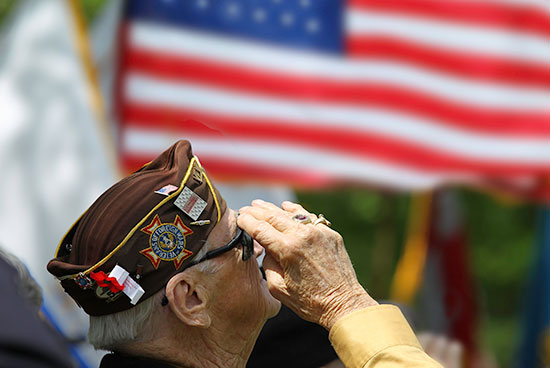
It might seem incontrovertible: Wisconsin loves its veterans. The numerous veterans’ treatment courts, Wisconsin’s decision to offer aspiring veteran attorneys the opportunity to take the bar exam free of charge, and the multitude of veteran discounts offered by private Wisconsin businesses are just a few of the many examples of Wisconsin’s veteran-friendly outlook. This is why it is surprising that there are so few Wisconsin lawyers available to assist veterans in preparing, presenting, and prosecuting their claims for disability benefits provided by the U.S. Department of Veterans Affairs (VA).
Let’s start with the facts. Wisconsin has approximately 360,000 veterans, nearly three-quarters of whom are war-era veterans. 71,000 of those veterans already receive some sort of disability compensation from the VA and nearly one-half of Iraq and Afghanistan veterans will eventually end up filing a claim. Yet, many of these veterans find it difficult to locate professional legal assistance, instead relying on a combination of veteran service organizations and their own skills and knowledge to file their claims.
Why don’t these veterans seek the help of a lawyer? The answer is threefold. First, a lawyer who wants to represent veterans must pursue accreditation through the VA. While there are provisions that allow a lawyer to represent one veteran without becoming accredited, a lawyer who wants to represent more than that single veteran must obtain VA accreditation to do so. Second, the number of Wisconsin lawyers who are accredited is alarmingly low. At last count, there were a mere 71 accredited attorneys available to serve all of Wisconsin’s 360,000 veterans. Third, many Wisconsin lawyers are simply unaware that veterans need their help.
How to Become an Accredited Lawyer
Fortunately, the process to become an accredited lawyer is both straightforward and inexpensive. It is, without a doubt, the easiest and most painless admission to practice that a lawyer is ever likely to pursue.
The requirements to become accredited are the following:
-
Be an active attorney in a state or territory,
-
Obtain letters of good standing,
-
Fill out VA Form 21A, and
-
Mail or fax everything to the VA for processing.
Assuming everything is in order, the applicant will be accredited in 60-120 days. You might have noticed that I have not mentioned the cost of becoming an accredited attorney. There’s a good reason for that: There is no cost beyond that of obtaining letters of good standing and postage, if the applicant mails in forms. The VA has made the process of accreditation easy because there are not enough lawyers currently accredited to meet demand.
 Chad D. Post, Temple 2017, is a veteran’s law attorney in Washington, D.C. He previously worked as an information technology engineer and cybersecurity expert in conflict zones around the world for various Department of Defense contracting companies. He is also interested in privacy law, cyberlaw, and quixotic tilting at windmills.
Chad D. Post, Temple 2017, is a veteran’s law attorney in Washington, D.C. He previously worked as an information technology engineer and cybersecurity expert in conflict zones around the world for various Department of Defense contracting companies. He is also interested in privacy law, cyberlaw, and quixotic tilting at windmills.
Maintaining accreditation is also easy. In the year following accreditation, a lawyer is required to complete three hours of veteran-centered continuing legal education (CLE). After completing the first year as an accredited attorney and satisfying the CLE requirements, a lawyer must complete three hours of CLE every two years to maintain accreditation. A number of organizations, such as the Practicing Law Institute (pli.edu) and the National Organization of Veterans’ Advocates (vetadvocates.org), offer veteran’s law CLE programs for a fee. Accredited lawyers may also locate relevant courses on their own. Finally, a lawyer must submit letters of good standing every year to confirm with the VA that he or she is compliant with court and state bar membership requirements and ethical standards.
Now is a good time to become accredited. The Veterans Appeals Improvement and Modernization Act of 2017, Pub. L. No. 115-55, took effect earlier in 2019, making massive changes to the way the VA processes veterans’ claims and appeals. This puts newly accredited attorneys in the unusual position of entering the field at a time when almost everyone will be learning how to navigate the new claims-prosecution procedures.
What Accreditation Allows
The answer to the question of what VA accreditation allows lawyers to do is complicated.
Resources About Lawyer Accreditation and VA Courts
Here are a few resources for lawyers interested in representing veterans with initial claims and appeals.
An accredited lawyer can assist a veteran through the first two levels of the claims process. First, the lawyer can help the veteran file the veteran’s initial claim at the local regional office, called veterans’ first “bite of the apple” by the VA. If the regional office grants the veteran’s request and the veteran is satisfied with the amount the regional office is offering, the accredited lawyer’s job is done.
If the regional office denies the veteran’s claim or grants an amount the veteran considers to be less than satisfactory, the accredited lawyer can assist the veteran with an appeal to the Board of Veterans Appeals (BVA), where evidence is reviewed de novo. If the BVA also denies the veteran’s claim, then the veteran can appeal to the Court of Appeals for Veterans Claims (CAVC).
However, accreditation is not sufficient to permit a lawyer to practice before the CAVC. To assist veterans with appeals at this stage, lawyers must be admitted to practice by the CAVC. Similarly, to take veterans’ appeals to federal courts of appeals, the Federal Circuit, and the U.S. Supreme Court, lawyers must be admitted to practice by those courts. Accreditation is enough for the vast majority of lawyers, however, if they do not intend to make veteran’s law their career focus.
Advantage of Having an Accredited Attorney
In the abstract, helping veterans seems like a noble goal in and of itself. However, there are plenty of veterans service organizations available to assist in the claims process. Why, then, are lawyers even necessary for more than the most complicated cases?
Filing a claim is, on the surface, a simple process. Most of the paperwork is filed on or attached to official VA forms, and the VA has a duty to assist the veteran in obtaining relevant evidence. The VA must also construe self-represented veterans’ arguments in the light most favorable to the veterans’ claims. Even the BVA is bound to offer veterans reasonable assistance and, when it finds that the VA failed in its duty to assist, must remand the case for additional development and reconsideration. Given these rules, it almost seems that lawyers would be unnecessary in this veteran-friendly framework. But appearances can be deceiving.
Statistics indicate that lawyers are more successful at getting veterans the benefits to which they are entitled.
Although filing a claim might be easy, knowing what to file (and occasionally, what not to file) is not so straightforward. There are plenty of pitfalls self-represented veterans may encounter along the road to seeking disability benefits. If veterans run afoul of one of these rules, their claims might be denied or remanded for development. If a veteran chooses the wrong words or neglects to identify an additional disability for which the veteran would be entitled to benefits, the veteran might end up getting paid less than is rightfully owed. Benefits begin to accrue when the veteran files a claim for a particular disability, so failing to properly identify a disability may cause the veteran to lose out on years of payments.
Even veterans who file through a VSO might encounter some of these pitfalls. VSO staff members deserve respect for the countless hours they spend helping veterans file their claims. But statistics indicate that lawyers are more successful at getting veterans the benefits to which they are entitled. While I was unable to find statistics on comparative success rates for veterans represented by themselves, VSOs, or lawyers at the regional-office level (alas, my FOIA request is pending), the BVA does publish statistics on just that in its yearly reports. In 2018, self-represented veterans received a grant from the BVA a mere 27 percent of the time. VSO-represented veterans fared better, with the different VSOs coming in between 32 and 38 percent. Veterans who had lawyers, however, succeeded almost 45 percent of the time.
Conclusion
Lawyers looking for a pro bono opportunity should seriously consider becoming an accredited VA attorney. Wisconsin’s veterans will thank you, their families will thank you, and Wisconsin residents will thank you for helping very deserving individuals navigate a process that can be slow, difficult, and frustrating.
If you’d like more information about any aspect of the process or you simply want to chat about veteran’s law, my inbox is always open. Feel free to send me a message at cpjd@pm.me, and I’ll do my best to answer. Thank you for reading, and I sincerely hope to see the list of accredited VA attorneys in Wisconsin grow.
Meet Our Contributors
What was one of your best or worst travel experiences?
 Though I’ve put in enough miles aloft to travel to the moon and back, my unexpected layover in London over Christmas 2012 was one of the more memorable … and unexpectedly pleasant … travel experiences I’ve had.
Though I’ve put in enough miles aloft to travel to the moon and back, my unexpected layover in London over Christmas 2012 was one of the more memorable … and unexpectedly pleasant … travel experiences I’ve had.
I’d just wrapped up a short-term consulting gig in Kuwait and was on my way back to the United States to prepare for my next opportunity. By the time I got around to booking a flight, the only options open were middle seats on flights through Heathrow, with layover options limited to “I can’t possibly run to that gate in time” and “well, I guess I could sleep in the airport for a while.” Given my time constraints, I opted for the latter.
While my original plan had been to sleep on a seat in the airport lobby (alas, it would have been neither the first nor the last time I did so), 24 hours seemed like an awfully long time to camp out in Heathrow. So … I grabbed my stuff, sped through customs, and proceeded to London proper.
Though the experience in London was tame compared to some of my other adventures, the experience of wandering a quiet London on Christmas was a relaxing reprieve from my typical routine. Most important? I got to watch the Doctor Who Christmas special live from the comfort of my Paddington Station hotel, which was simultaneously nerdy and incredibly pleasing.
Chad D. Post, Washington, D.C.
Become a contributor! Are you working on an interesting case? Have a practice tip to share? There are several ways to contribute to Wisconsin Lawyer. To discuss a topic idea, contact Managing Editor Karlé Lester at (800) 444-9404, ext. 6127, or email klester@wisbar.org. Check out our writing and submission guidelines.
